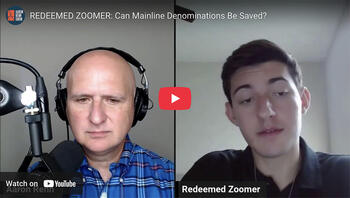
Generation Z is America’s first post-Boomer generation.
My Generation X was enculturated into the Baby Boomers’ world. Thinking about the songs from my youth in the 1980s, it’s amazing how many of my favorites were literally about the Boomers, such as Bryan Adams’ “Summer of ‘69” or much of Bruce Springsteen’s oeuvre. Phil Collins was never more Boomer than when he sang, “My generation will put it right / We’re not just making promises / That we know, we’ll never keep.”
I long noticed that while I could easily have a conversation with people my Boomer parents’ age, there was always a disconnect when talking to those from my grandparents’ Greatest Generation. They were just culturally different. There was a cultural gap between us that wasn’t there with the Boomers.
The Millennials for their part were also often raised by Boomers. And they too seem very oriented around the Boomer world. Think about the way so many Millennial evangelicals are dedicated acolytes of Boomer or older leaders, or at least view them as their heroes. Collin Hansen wrote a book about Tim Keller and runs a center named after Keller. Matt Smethurst just wrote a another book about Tim Keller. Megan Basham is effusive in her praise for John MacArthur. William Wolfe wrote a piece for First Things calling on today’s leaders to, “Dare to be a James Dobson.”
Generation Z is the first generation fully free from the Boomer cultural grip.
For example, while speaking to someone who works for a major Christian non-profit, he observed that his younger staff were confused at the press over James Dobson’s recent death, because they didn’t know who he was. They’d never heard of him.
Gen Z is not wedded to these Boomer figures, may not even know who they are, and are certainly not concerned with any sensibilities around them.
Redeemed Zoomer, who was one of the guests on my podcast episode from yesterday, not only doesn’t lionize John MacArthur, he pointedly says that MacArthur was a Nestorian. (I’m not an expert on either MacArthur or Christology, but it does appear that he made statements about Mary that are similar to what the Nestorians said).
While he may not be entirely representative of his generation, Redeemed Zoomer is a great example of how many Gen Z people see the landscape of America very differently than previous generations. Rather than suggesting leaving for the most conservative evangelical denomination or church one can find, he advocates joining a mainline church and working for renewal within. He thinks that if enough people do this, the faithful will inherent these denominations. He calls this “Operation Reconquista,” and I interviewed him about it two years ago.
I’m not sold on the idea that his plan is feasible. But his thinking illustrates the way that Generation Z is taking a new look at a very changed landscape. Many Boomer conservative Christians endured bruising battles with liberals in these institutions, which they lost. This has shaped their thinking, and in turn that of the generations they raised or influenced.
Gen Z is arriving on the scene after mainline decline has reached a much more advanced point, and in which some of the older veterans of previous denominational wars are no longer around. They view these denominations an an opportunity zone.
Read the rest of this piece at Aaron Renn Substack.
Aaron M. Renn is an opinion-leading urban analyst, consultant, speaker and writer on a mission to help America's cities and people thrive and find real success in the 21st century. He focuses on urban, economic development and infrastructure policy in the greater American Midwest. He also regularly contributes to and is cited by national and global media outlets, and his work has appeared in many publications, including the The Guardian, The New York Times and The Washington Post.
Photo: screenshot from author's podcast interview.












